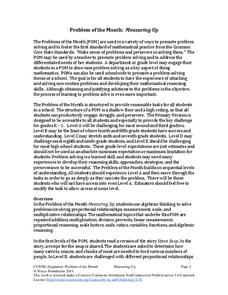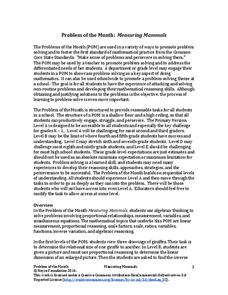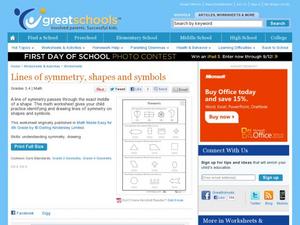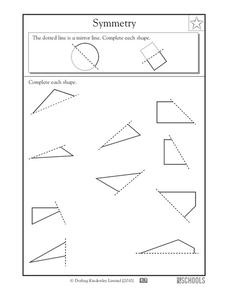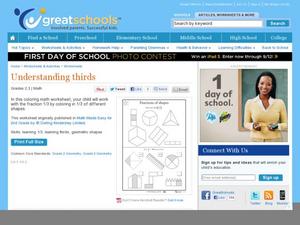Digging Into Math
Classifying Triangles
Young mathematicians explore the world of three-sided shapes in this lesson on the different types of triangles. Starting with a general introduction to classification using Venn diagrams, children learn how to categorize triangles based...
Heather Sparks
Integer Football
They could go all, the, way...to a deeper understanding of integers with this fun math game. Using the included printable materials, young mathematicians practice adding integers and calculating absolute values as they compete in a game...
Centre for Innovation in Mamatics Teaching
Area, Perimeter and Volume
Develop young mathematicians' knowledge of two- and three-dimensional shapes with this geometry workbook. From learning about the classifications of different shapes and figures to calculating their area, perimeter, and volume, this...
Noyce Foundation
Measuring Up
Teach the basics of measurement and conversion with a five-lesson resource that builds an understanding of proportion and measurement conversion from elementary through high school. Initially, young scholars use ratios to determine soup...
Noyce Foundation
Measuring Mammals
Explore the meaning of scale and proportion with a set of five activities that examines the topic from elementary through high school. The first lessons explore ratio by examining pictures of different sizes. The next three activities...
Noyce Foundation
Surrounded and Covered
What effect does changing the perimeter have on the area of a figure? The five problems in the resource explore this question at various grade levels. Elementary problems focus on the perimeter of rectangles and irregular figures with...
Boys Town
More Tools for Teaching Social Skills in School
Put an end to wasted instructional time with this lesson on responsibility and preparedness. After completing this series of activities students will learn the importance of these social skills not only in the classroom, but at home and...
Oklahoma State University
Hairy Heredity
Young scholars learn that heredity comes down to the flip of a coin with this cross-curricular math and science lesson. Using smiley faces as a model, students toss coins to determine which dominant or recessive traits will be passed on...
Sea World
Seaworld Science Activity
A fun collection of activities about marine life would be a great addition to your elementary science unit. From cute penguins to scary sharks, the unit features crafts, experiments, and basic research projects that will teach your...
Curated OER
Choosing a College
How can mathematics help scholars choose a college? High schoolers learn how they can use decision matrices to rank colleges based on selected criteria. They also see how to weigh criteria using multiplication of the decision matrix by a...
Curated OER
Fractions and Rationals
Upper elementary and middle schoolers solve 16 types of problems to include writing fractions to represent shaded portions, writing a mixed number to represent certain points on a number line, and changing equivalent mixed numbers to...
Illustrative Mathematics
Who Has the Best Job?
Making money is important to teenagers. It is up to your apprentices to determine how much two wage earners make with their after school jobs. Participants work with a table, an equation, and a graph and compare the two workers to see...
K12 Reader
Conjunctions: And
Math isn't the only subject where pupils get to add! Focus on conjunctions with a grammar lesson in which class members connect nouns with the word and.
Curated OER
Drawing Math
In this drawing math activity, students use their problem solving skills to draw 8 pencils, 3 apples, 6 rocks, and 7 trees.
Curated OER
Drawing Math
In this drawing math learning exercise, students use their counting skills as they draw 3 pencils, 5 apples, 7 rocks, and 3 trees.
Math Worksheets Land
Add and Subtract Multi-Digit Whole Numbers
Help young mathematicians see the value in addition and subtraction. Offering one addition and one subtraction problem, this worksheet walks students step-by-step through the solutions of each, starting in the ones place and working...
Curated OER
Shape Fractions
Use shapes to visualize fractions! Elementary learners color 1/2, 1/3, 1/4, 1/8, and 1/10 of various shapes. A great addition to your fractions lesson, or to introduce geometry in your math unit.
Curated OER
Lines of Symmetry, Shapes and Symbols
Which shapes are symmetrical? Third graders decide which shapes have lines of symmetry, and which shapes are not symmetrical. They work on 13 shapes and symbols, four of which have lines already drawn through them. Use this resource to...
Curated OER
Place Value for Decimals
Are your fourth graders having problems with decimals? Help them identify the place value of various numbers. Here, they describe what happens to the value of different numbers, as well as select numbers with given values in the tenths...
Howard County Schools
Exit Ticket 3.MD.5
Intended for use as an exit ticket, this worksheet can be used as an extension to a lesson, test, or even homework. Learners complete three tasks that involve finding the area of a figure in square units. Young mathematicians can be...
Curated OER
Same Shape and Size
Can your kindergartners recognize shapes? What about when they are in different orientations? Youngsters study groups of shapes to determine which have the same shape and size. Two of the groups have triangles and ovals, and the other...
Savvas Learning
A Picture Tells . . . Three Facts
Elementary schoolers evaluate a set of shapes in which some are shaded and some are not. They then write three multiplication sentences for each group of shapes that tells the number that are shaded, not shaded, and total. There are...
Curated OER
Symmetry
Enhance your geometry lesson by working with shapes. Fourth graders follow lines of symmetry to complete ten shapes, most of them currently triangles. Have pupils color each half of their shapes to reinforce the idea of symmetry!
Curated OER
Understanding Thirds
Combine geometry and fractions with an innovative activity. After your lesson on 1/3, have second graders shape 1/3 of each geometric shape. Shapes include squares, circles, rectangles, and polygons. In the second section, pupils write...





